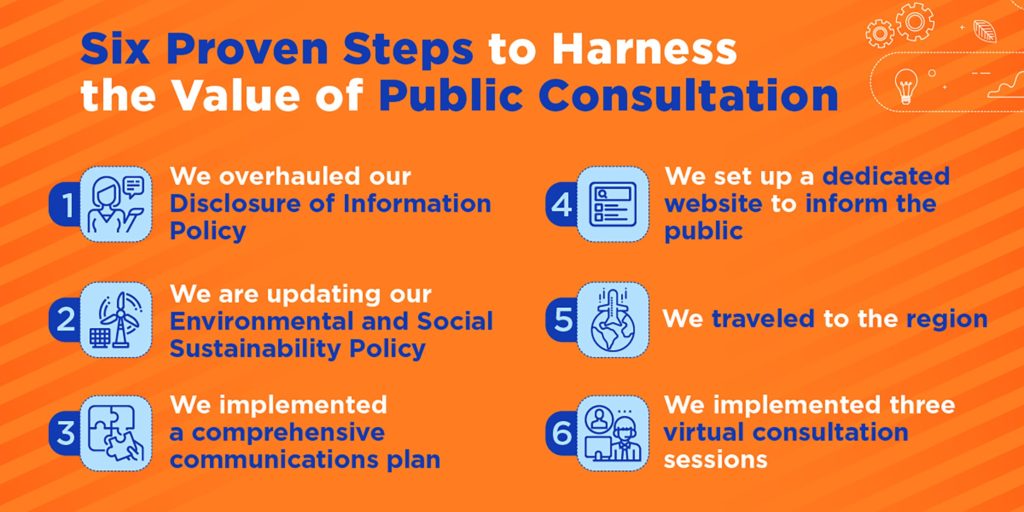When dealing with policy making and project risk management, public consultations provide insightful tools to better improve lives within communities and societies. We assigned our best talent to provide solutions in this field, and now we’d like to share how we’re making things happen.
The digital revolution has radically transformed how people engage with organizations that impact their lives. In today’s hyper-connected world, citizens consider access to information a fundamental right; they’ve grown used to directly addressing policymakers, and view advocacy as an effective tool to protect and promote their interests.
There are organizations that perceive this enhanced activism as an obstacle to the design and implementation of sustainable policies and projects. However, at IDB Invest, our own experience tells us that engaged stakeholders can provide information critical to help solve major development challenges.
In the Porto Sergipe project in Brazil, engagement with the Cajueiro community turned out to be essential in transforming opposition into project support, as well as for the development of a participatory involuntary resettlement plan. Across Latin America and the Caribbean there are plenty examples in which public consultation and engagement have been key when designing better solutions for project implementation.
IDB Invest has been involved with several projects where feedback from local communities has been fundamental to enhance project design and implementation. Benefit-sharing and mitigation of unanticipated impacts are among the most common aspects raised by local stakeholders.
Because of these positive experiences, IDB Invest is constantly striving to find new ways to harness this enhanced activism with the objective of pushing forward the attainment of UN Sustainable Development Goals (SDGs) in Latin America and the Caribbean. As part of this process, we decided to strengthen our sustainability framework to better reflect the organization’s new mandate, its vision and current best practices.

Digital feedback and engagement
By listening to a wide range of voices from across the region, we were able to gather ideas, opinions and recommendations on how to improve the development of new policies and guidance, and more importantly on how to enhance communication and to improve operational work with projects. Here are six definitive steps:
We overhauled our Disclosure of Information Policy. The updating began in 2018; the new policy includes a clear timeline for the release of corporate information to the public and establishes channels for stakeholders to communicate their views on our investments and operations. Its new title was chosen to reflect IDB Invest commitment to transparency and accountability: IDB Invest’s Access to Information Policy.
We are updating IDB Invest’s Environmental and Social Sustainability Policy. Throughout 2019, our team worked a policy update that is clearer about roles and responsibilities, and that incorporates best practices and lessons learned in the field. Because it is our goal to capitalize on the knowledge and goodwill of our stakeholders, on June 17th, IDB Invest opened its draft Environmental and Social Sustainability Policy to a public consultation process.
We implemented a comprehensive communications plan. We aimed to reach out to stakeholders who might be interested, broadly or specifically, on the Policy. Hundreds of email invitations were sent to clients, international and regional civil society organizations (CSOs), indigenous groups representatives, academics, community leaders, government officials and international organization representatives. A press release announcing the beginning of the consultation was complemented with weekly posts on IDB Invest’s social media channels.
We set up a dedicated website to inform the public about the proposed enhancements to the Policy and invite them to share written comments. In a few days, we received more than 100 requests from all over the region to participate in the process. CSOs, private companies, and international development organizations also submitted briefs and other written documents through the portal.
We traveled to the region. IDB Invest’s team met face-to-face with clients, civil society representatives, and academics in Bogota, Buenos Aires, Kingston, and Panama City. A face-to-face meeting also took place in our headquarters in Washington D.C.
We implemented three virtual consultation sessions. The sessions were in Spanish, English and Portuguese, through a free and widely used online meeting platform. Using this format, we were able to connect live with people directly involved with IDB Invest’s projects, who due to their geographical location or financial constraints, could not attend the in-person meetings.
After 120 days of consultation, the team is ready to carefully review the many comments and suggestions that will reinforce the effectiveness of IDB Invest’s sustainability framework.
The public consultation provided an opportunity to strengthen IDB Invest’s relationship with clients and civil society representatives. The meaningful dialogue established with these actors has continued, especially with CSOs who are currently working with the ESG team to tackle specific environmental and social issues in the region. We are very grateful for the valuable insights received and the benefits of the consultation process have extended far beyond receiving inputs to a policy update.
Updating the Sustainability Framework in times of increased engagement has reinforced the notion that effective policymaking is best done out of the confines of headquarters. Nonetheless, we have also realized that the advances in technology provide immense opportunities to expand consultation process beyond a handful of sites. The changes made to our policies will allow IDB Invest to continue to work with clients and communities, so that firsthand knowledge is used to improve projects that will propel Latin America and the Caribbean forward in a sustainable manner.
The consultation process might be over, yet our doors will always remain open to those who want to improve lives and pave the way to a brighter future by committing to sustainability.■


